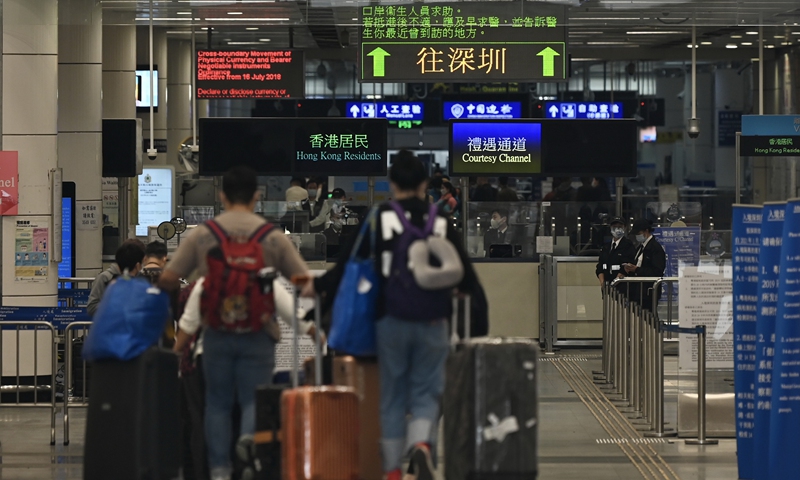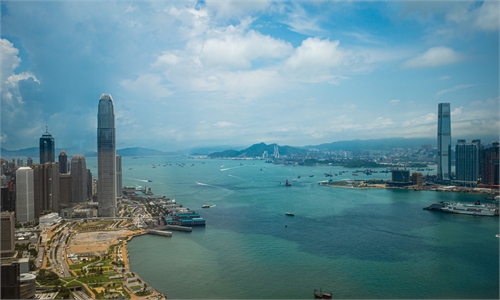
A file photo shows that travelers pass through a land port connecting Hong Kong and Shenzhen, South China's Guangdong Province. Photo: IC
A growing trend of Hong Kong residents "tripping north" to Shenzhen has been gaining more attention. It is reflected not only from leisure activities to everyday purchases, but also from education and job seeking to medical services, showcasing a deeper integration between the two regions.
Such integration has underscored the significant role of mainland's support for Hong Kong, as well as Hong Kong's confidence in promoting integrated development, as highlighted in chief executive John Lee's policy address last year, which mentioned the cooperation among Guangdong-Hong Kong-Macao Greater Bay Area for a staggering 32 times.
Meanwhile, Shenzhen has extended its arms to embrace its neighbor, introducing a slew of preferential measures to attract more Hong Kong residents for investment and consumption. Against the backdrop of a sluggish global economy, the mutual support between the mainland and Hong Kong has become even more precious and valuable.
According to the latest data from the Hong Kong SAR Immigration Department, as of December 30, 2023, there were a total of 53.34 million trips made by Hong Kong residents "heading north" throughout the year, with over 40 million departing through the Shenzhen-Hong Kong port.
Hong Kong media reports said that unlike before 2019, Shenzhen has now taken the lead in this cross-border city pair, as the consumption pattern of Hong Kongers in Shenzhen gradually shifted from leisurely spending to everyday purchase, from dining and entertainment to medical check-ups, grocery shopping and even real estate purchases.
Take supermarket shopping as an example. The Sam's Club in Shenzhen has recently become a hit among families and young people in Hong Kong.
During weekends and holidays, it is very common to see people from the SAR jumping on buses and going to the supermarket for a sweeping experience, not only to stock up on groceries and goods, but to also enjoy dining, entertainment and a fully immersive experience not found in the SAR region, the Global Times learned from a number of Hong Kong residents.
Aaren Chan just spent his New Year holidays in Shenzhen, during which he tried hot pot, barbecue, snacks from other Chinese regions and drunk a lot of milk tea. "The cost of a good meal is half price, compared with Hong Kong. In Shenzhen you are spoilt for choice and the vegetables and fruits are much cheaper."
Chan got the idea of spending the holidays in the mainland with his friends, who travel frequently to the mainland for quality food, shopping and Karaoke.
Chan visited other major mainland cities too like Beijing and Shanghai. He had never been to Shenzhen before, a neighboring city and he now sees it as a young, vibrant and very inclusive city.
Apart from being cheaper and the variety it offers, Shenzhen is attracting more Hong Kong neighbors because of its high-quality services. A Hong Kong resident surnamed Wu, who have been occasionally visiting Shenzhen for years said that she had felt great improvements in the service quality in Shenzhen over the last few years. "For example, service staff there will proactively inform you about discount offers, and their friendly attitude will make you feel comfortable. This makes spending money an enjoyable experience," she said.
Some Hong Kong people have different, and sometimes negative, stereotypes of the mainland. They should take a bullet train from West Kowloon or walk across the border point to see with their own eyes, Chan said, "I am glad more and more young people are doing this."
Such a phenomenon, however, has drawn sour grapes remarks from some Western media, attempting to sow discord between the mainland and SAR through ungrounded claims.
The BBC said in a report on Monday that the "tripping north" trend is making trade deficit between Hong Kong and Shenzhen continues to widen, and as it reaches a point of irreversibility, "Hong Kong's economy will suffer until it dies. In the long run, mainland consumption temptation could be seen as a slow poison."
These remarks were blasted by locals and experts, who said the concept BBC is selling that "one's gain is another one's loss" is simply laughable.
Tang Fei, a member of the Legislative Council of Hong Kong, told the Global Times on Wednesday that even without the rise of "mainland-bound consumption," it does not mean that these expenditures will be spent within Hong Kong.
"The fundamental problem lies in the high prices and inadequate services in Hong Kong. People feel that the money spent is not worth it, so they would rather keep it in the bank. The issue is actually a lack of self-improvement and being relatively stagnant, which has allowed Shenzhen's rapid development to catch up," Tang said.
Contrary to what Western media has been hyping, the expert believes this trend has in turn facilitated the upgrading of Hong Kong's local consumer market to further improve its cost-effectiveness, and has prompted Hong Kong to push its other unique advantages, such as education and job opportunities.
Chan, a physiotherapist, also dismissed the claim that Shenzhen's attraction will drain Hong Kong economy. "Hong Kong has its own advantages and potential. Exchanges and integration will create new opportunities, not take opportunities away from the other."
A Beijing resident, who is applying for Hong Kong's high talent pass scheme, told the Global Times, on the condition of anonymity, that she has a plan of moving to Hong Kong for its convenient connections to the world but also for education opportunities for her children in the future.
People on the mainland now see Hong Kong less as a place for shopping and Disneyland, but more as another metropolis offering lots of job opportunities for young people, the resident said.


